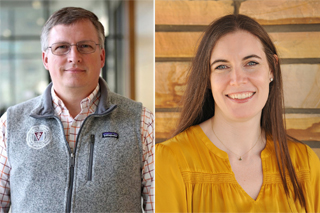collage

Left, photo courtesy of Dr. Harold McKenzie.
Right, University of Tennessee photo by Phil Snow.
Dr. Harold McKenzie (left) teaches at the Virginia-Maryland College of Veterinary Medicine and is president of the American College of Veterinary Internal Medicine. Dr. Maryanne Murphy (right) teaches at the University of Tennessee College of Veterinary Medicine and was president of the American College of Veterinary Nutrition before it joined with the ACVIM.
Since nutrition became a recognized specialty in U.S. veterinary medicine in 1988, the number of diplomates has grown to around 100. That's not enough people, though, to sustain the activities of a stand-alone organization, the group concluded.
The American College of Veterinary Nutrition (ACVN) formally disbanded on Oct. 1 and its members are now part of the American College of Veterinary Internal Medicine (ACVIM), bringing that organization's membership to about 3,250.
Nutrition is ACVIM's sixth specialty. The others are small animal internal medicine, large animal internal medicine, cardiology, neurology, and oncology, all of which evolved from within ACVIM. Nutrition is the first to have formed separately and requested to join, according to Dr. Harold McKenzie, president of the ACVIM.
"This is not a situation where ACVIM was looking outside and looking to draw other specialties in," McKenzie said. "Nutrition came to us, and we were very receptive and open to their proposal."
The nutritionists opted to seek another structure when they realized that the relatively small size of their college — 90 active diplomates, 10 retirees and 10 honorary members — made it challenging to perform the many duties incumbent on it. The duties include developing, administering and grading examinations for aspiring nutritionists, never mind aiming to serve as a leading voice on matters of animal nutrition, said Dr. Maryanne Murphy, president of ACVN at the time of the transition.
Because most of its funding came from member dues ($450 a year, or $400 for those paying early), the group had a modest budget and relied on the labor of member volunteers, having no paid staff, Murphy said.
While some ACVN members worried about the group losing its autonomy, the financial reality was hard to counter, she said: To hire an executive director, "we'd have to either significantly increase our dues ... or find a different source of revenue to pay that executive role."
One possible revenue source could have been sponsorships from commercial entities.
"Other specialty organizations very frequently get donations from pharmaceutical companies and pet food companies and all of those things," Murphy said. "As an organization, we were just so careful about avoiding any appearance of conflict of interest with pet food companies ..."
Over the years, ACVN had accepted corporate sponsorship for various activities, Murphy said; the question was whether to actively solicit more such funding "on a larger scale." The group planned to research how other organizations do that and at the same time, avoid conflicts of interest, she said, "but we were looking at that at the same time when everything was so positive with ACVIM, so we just kept going with that [path]."
As a much larger organization, ACVIM has considerably greater resources. Its operating budget for 2022 is about $6.5 million, and it has 24 full-time staff, according to Dr. Linda Fineman, the chief executive officer. Its membership fee for 2022 is $510.
History of specialties and ACVIM
In considering whether to bring nutrition into the fold, ACVIM examined the question strategically and operationally, McKenzie, the group's president, said. "Was there synergy amongst the specialties, and did ACVIM have the resources and ability to handle the addition of nutrition?" The answer to both questions, ultimately, was yes.
"There's a lot of interrelationship between nutrition and the diseases that we deal with in all five of our other specialties," McKenzie said.
ACVN members felt the same way, Murphy said: "While finances were a significant factor driving us to consider our options, the decision to move forward with ACVIM specifically was also because it was a good fit from a general membership and medicine perspective."
Although the integration is a done deal, there continue to be frequent meetings to work through details, Murphy said. "A big thing that the ACVN board is very concerned about, and that ACVIM is very concerned about, is not negatively impacting anyone who's already in a training program," she said.
That means not switching in midstream the certification rules and procedures for someone already in a nutrition residency.
For example, under ACVN, a candidate for board certification would take a single exam over 1½ days. ACVIM candidates sit for two exams: one general exam and one for the specialty. Changing that system will be gradual. "Candidates currently in [nutrition] training programs are not yet required to take the general exam," Murphy elaborated.
The number of affected candidates is not large. The past five times the exam was administered, anywhere from two to 13 candidates participated, with an average of six to seven per year. The training period for would-be nutrition specialists is two years, so it will take at least two years to complete the transition from the ACVN protocol to ACVIM's.
As for general practice veterinarians and veterinary clients, effects of the change will be negligible, Murphy said. "It's not that the nutritionists have gone away," she said. "We are here ... we are [just] part of a different organization."